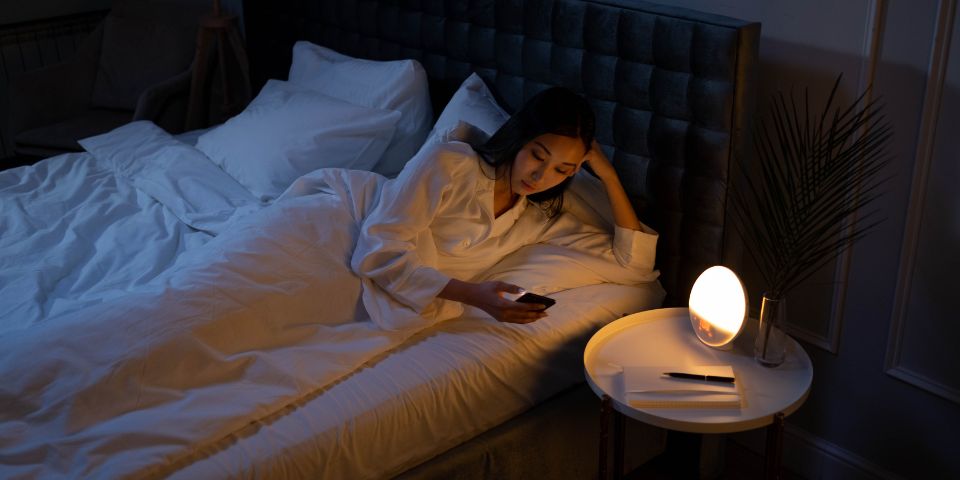Insomnia symptoms and treatments
What is insomnia?
Insomnia is defined as regularly having issues sleeping well. This can mean difficulties getting to sleep, not being able to stay asleep (frequent waking at night), or waking up and not being able to go back to sleep again. Insomnia covers not getting enough good-quality sleep. During the day, this means that you will experience fatigue, irritability, and impaired memory.
What causes insomnia?
Here is a list of things that commonly cause insomnia:
- Stress, anxiety and depression
- Persistent loud noise such as from neighbouring houses/flats
- Temperature of the bedroom (too hot or too cold)
- Uncomfortable mattress
- Alcohol, nicotine, caffeine
- Side effects of medications such as decongestants
- Jet lag
- Shift work
- Having a newborn baby
- Exposure to blue light before bed
- Deliberately fasting such as for religious reasons as this tricks the body into thinking food is scarce so staying awake longer to forage is better for survival.
Pregnancy brings its own causes of insomnia:
Nausea, heartburn, snoring due to blocked nose, back pain or leg cramps, urinating frequently at night due to pressure on the bladder from baby, and in the third trimester waking every 3hrs as body prepares you for early life with a newborn. Of course homeopathy is 100% safe during all stages of pregnancy and during breastfeeding.
Menopause can also cause insomnia due to anxiety, hot flushes, night sweats, snoring or sleep apnoea, and restless leg syndrome.
Brief history of Insomnia
Insomnia Symptoms and Treatments are only a part of modern-day life.
Hunter-gatherers would get 7-8hrs of sleep per night, starting 2-3hrs after sunset. They would also take a 30-60 min nap in the early afternoon and post-lunch, but only in the summertime.
In modern times, most people now get less than 7 hours of sleep per night regularly.
Sleep is THE magic pill for everything! It can help you have more energy, be more creative, be happier, and be less stressed. It can also help you lose weight and not gain weight easily, increase fertility for both sexes, and avoid long-term chronic diseases such as cancer, diabetes, and heart disease.
The World Health Organisation (WHO) classifies night-shift work as a probable carcinogen (i.e., it probably causes cancer). This puts night-shift work in the same hazardous category as asbestos, arsenic, and diesel exhausts.
It even helps you to remember things better! Sleeping well after revision or learning something new helps you to ‘cement’ those facts in your brain.
Now consider the effects of poor sleep. Just 10 days of sleeping for only 6 hours per night has the same effect on the body as not sleeping AT ALL for 24 hours! If you actually haven’t slept for 24 hours, then your response times and cognition are the same as those of someone who is legally drunk. This is definitely something to consider when being treated by a junior hospital doctor who has had very little or no sleep in the last 24 hours.
Sometimes, there are obvious causes, like a newborn baby, but it can be difficult to find the root cause. There are a multitude of reasons our minds and bodies need good-quality sleep.
During sleep, our bodies heal and rest, and our minds need rest to process the day’s events.
Long term insomnia has been linked to CHD, diabetes, cancer, several inflammatory conditions, Alzheimer’s, psychiatric conditions and a poor immune function. In fact, insomnia can be an early warning sign for Alzheimer’s.
Unfortunately, there are still countries around the world that use sleep deprivation as a form of torture such as Myanmar, Iran, Turkey, Pakistan and the USA.
Sleeping pills
Prescription sleeping pills like Zolpidem can ‘erase’ memories rather than create them like natural good sleep does. You are also almost 5 times more likely to die and 40% increased risk of developing cancer with regular use over a 2.5yr period.
Even over-the-counter sleeping tablets which contain sedating antihistamines are not helping you to drift off into a natural good nights sleep. And of course, this is before I even mention the side effects of these drugs.
What can we all do to help get a good night’s sleep?
Here are my top 14 tips and why they are so effective:
1. Practice sleep ‘hygiene’.
This means looking at your physical sleeping environment. The bedroom should be fairly cool, but with enough bedding to keep you warm. Light should be blocked by heavy curtains or an eye-mask. Ear plugs can help with sound.
2. Warm bath and warm milk before bed.
These are both linked to our sleep routines as babies. Warm breastmilk was both nutritious and comforting. A warm bath relaxes our muscles and minds. Moving to a cooler bedroom (see above) mimics the diurnal change as the sun goes down. This tricks the body into producing melatonin, the ‘sleep’ hormone. Having warm hands and feet (hello bed socks) helps to cool down the body’s core temperature and aids going to sleep quickly and more efficiently.
3. Cotton loose pyjamas.
Some people sleep naked, other with full length pyjamas on. One thing is clear – you need to be comfortable to sleep! Cotton is a breathable material so is often best for sleeping in.
4. Avoid stimulants such as caffeine and nicotine.
Caffeine is a known stimulant, often used to wake us up in the morning! So not the best idea to consume this before bedtime. Even having a caffeinated drink at 12noon, can result in you having trouble falling asleep, as 50% of the caffeine content is still present in your blood stream 7hrs later. Caffeine is in: cola, chocolate, tea, coffee, green tea, ice cream, energy drinks, and some pain killers. A note of warning about decaffeinated items. Some of these can contain up to as much as 10% caffeine! Decaffeinated does NOT mean caffeine-free!
5. Avoid ‘blue’ light before bed.
Checking our phones or tablets, working late into the night on our computers is a very common habit nowadays. This is not good just before we sleep. It blocks 50% of the ‘sleepy’ hormone melatonin being released and hence it will take you much longer to fall asleep. Melatonin is in oats, bananas and dairy products.
6. Use a weighted blanket.
This can simulate being ‘swaddled’ or wrapped up tightly as a baby, both in the womb and cot. This can help us to drop off to sleep quicker.
7. Meditation and breathing exercises.
These help people to wind down and relax after a long day. They can help to ‘switch off’ and drop off to sleep quicker and easier. Find one that works for you – there are lots to choose from! If you are having lots of thought running around your head as you try to drop off, write them all down in the notepad. This works like a ‘screen-dump’ to get them out of your brain, and help you relax. Magnesium helps us to relax so applying a magnesium cream at night can aid sleep.
8. Check the side-effects of your medication.
Some medication has ‘alerting’ effects whilst others actually list insomnia as a side-effect.
9. Stick to a regular sleep routine.
Wake up and go to sleep at regular times, even at the weekend.
10. Exercise;
Exercise will help to exhaust you but ideally, do not exercise within 2hrs of bedtime.
11. Avoid alcohol before bedtime.
Alcohol is makes you drowsy but doesn’t promote good quality sleep.
12. Don’t take naps after 3pm.
Relax in bed before you actually go to sleep, by reading or listening to music.
13. Morning Light;
Expose your eyeballs to morning light as soon as you can after waking for at least 30mins. This will help to release melatonin 16hrs later.
14. Don’t lie in bed awake!
Get up and do something relaxing such as reading or listening to music until you get drowsy again.
Homeopathy can help to address your insomnia symptoms and treatments as well taking on board my sleep hygiene advice above.
The So Sleepy range by Tropic contains lavender and melatonin designed to help you drift off to sleep more easily. Contact me to purchase this and get a FREE gift too!
If you are waking at a certain time every night, have re-occurring dreams or fear is preventing you from sleeping, then book in a discovery call with me for specific homeopathic remedies to help you get a good night’s sleep.







